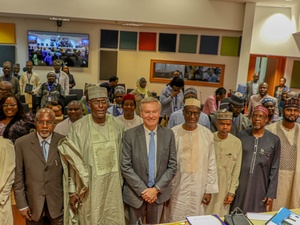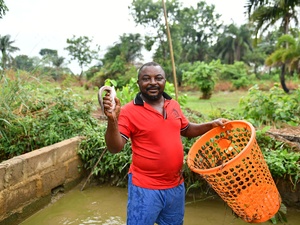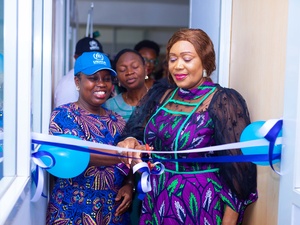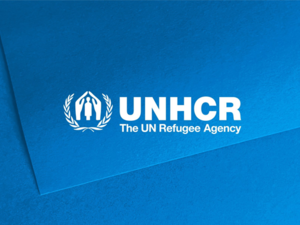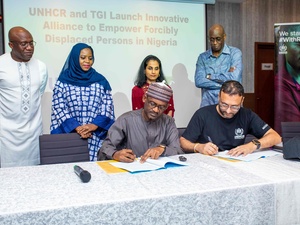Small business, big success

Small business, big success
“As we entered Bakassi IDP camp, life was not easy because we could not eat enough and I could not provide for the education of my children”, says 60-year old Usman Bura, a father of four and husband to two wives. “I want to thank UNHCR for helping me and my family to pick up our lives again.” In 2019, they received a cash grant of 3,000 Naira (today nearly 8 US$) and a business start-up kit worth 40,000 Naira (some 100 US$) along with a training in petty trading from UNHCR, the UN Refugee Agency, through its livelihoods partner American University of Nigeria (AUN).
Usman was one of the many vulnerable urban IDPs who were and are in dire need of assistance to meet their basic needs. UNHCR and its partner Grassroots Initiative for Strengthening Community Resilience had identified Usman’s family during a vulnerability screening in the Borno State capital Maiduguri after they had fled Guzamala local council for safety back in 2014, when non-State armed groups struck, killing many people.
Support does not stop with satisfying basic needs. Improving the self-reliance of vulnerable IDPs is critical for ensuring durable solutions for these families. “Usman’s family was among those that had not received any food ration from the government for a very long time. Yet, because of his advanced age, he could not go out to work like others,” explains AUN Project Director Kowiyu Kunle Gbolahan.
Having lost everything in flight, Usman knew to use the opportunity of the cash grant and the training to bounce back. He multiplied the little investment in no time after selling basic articles such as toiletries, condiments, and confectionaries in the beginning. He managed to double his stock and add 15 different products and his business grew continously, with his weekly earnings jumping from about 4,000 Naira (some 10 US$) to nearly 20,000 Naira (some 50 US$). This enabled him to pay for food, basic needs of the family and tertiary education of his first son. Beaming with a smile, he says that he now is able to settle medical bills of his family and even support relatives.
When the government initiative to close IDP camps led to shutting Bakassi camp in 2021, Usman had a stock of goods which was estimated to be worth 100,000 to 150,000 Naira (some 240 to 360 US$). Usman and family were among those scheduled to go back to Guzamala. However, he chose to remain in Maiduguri. He now lives in a rented 2-bedroom house in Musari community where he pays an annual rent of 80,000 Naira (some 200 US$) not least from the income his UNHCR-supported business brought him. It is here that he has re-established his shop. ‘My business,” says Usman with tears in his eyes, “is doing even better than in the camp”.
"After a very long time, we can now sleep in a good house, study in good schools, eat three meals a day, and have a peace of mind."
His 32-year-old son, Babagana Usman, who studies Public Administration student at Ramat Polytechnic Maiduguri, is also full of joy about his father’s achievements after being empowered: “After a very long time since our displacement in 2014, my siblings and I can now sleep in a good house, study in good schools, eat three meals a day, and have a peace of mind.”
His father has not only found a means of livelihoods for the family of seven, but also a place in the community. “Usman,” says Amina, a customer who queues at the shop to buy condiments, “is a blessing to us in this community because he sells virtually everything that we need for our family use. Since he arrived here, we no longer have to travel long distances to buy basic products”.
“UNHCR supports the local integration of vulnerable IDPs such as Usman to attain a point where they no longer have any specific assistance and protection needs that are linked to their displacement and where they can enjoy their rights without discrimination on account of their displacement,” explains Mohammad Irfan Adil, Head of Sub-Office Maiduguri. “Local integration is a pathway to solutions in this evolving context.”



